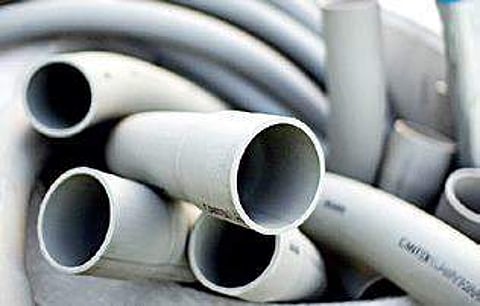

BENGALURU: Karnataka State Pollution Control Board (KSPCB) has shut down the state’s first flex or PVC Recycling Plant stating that it neither had permission nor sanction. The setting up of a unit to recycle hazardous PVC (polyvinyl chloride) or flex material at Kirigavalu, Malvalli taluk in Mandya district had recently drawn the ire of environmentalists. They stated there was no proper scientific method available to safely recycle this hazardous material and wondered how the authorities allowed this illegal unit to be set up. Also, the promoters had no clearance from the pollution board to set up the recycling plant. Further, recycling of PVC results in release of very harmful chemicals — dioxins and furans — causing serious health/environmental hazards.
KSPCB Chairman Lakshman said, “We haven’t given permission to set up any flex recycling unit in the state. This unit was located on the premises of a rice mill in Kirigavulu. In fact, I have given directions to seize and close the rice mill itself.”
On September 29, the Niravu Segregation and Recycling plant (promoted by the Sign Printing Industries Association of Kerala) was slated for inauguration at Kirivagulu. It was stopped by the officers of the KSPCB. Officials also seized 100 kg of PVC waste that had been brought from Kerala. A staff member of the plant said this was basically a venture for rebuilding Kerala. Shabbir said, “The inauguration of the plant was stopped by authorities as we had no licence from KSPCB. We had taken permission from the Malvalli Panchayat.”
A Malvalli Panchayat member said, “We had given permission only for scrap collection and segregation unit and not for any other kind of recycling.”
Toxic PVC waste
According to experts, PVC is the most hazardous product ever made by man. Apart from vinyl-based chlorine molecules, PVC contains toxic additives, stabilisers and plasticisers. It releases both dioxin and furan when it is burnt. There are no scientific methods for its safe recycling. Since recycling requires 200 degrees Celsius heat to convert the scrap to granules, the recycling process release both these toxic chemicals.
PVC recycling a myth
“PVC recycling is a myth. The unique chemical and economic characteristics of PVC makes it impossible to recycle and the only solution is to phase out its use,” says Peter Anderson, Recycle Worlds Consulting. According to the World Health Organization, dioxins are one of the dirty dozen group of dangerous chemicals, are highly toxic and can cause reproductive and develop mental problems, damage to the immune system, interfere with hormones and also cause cancer.